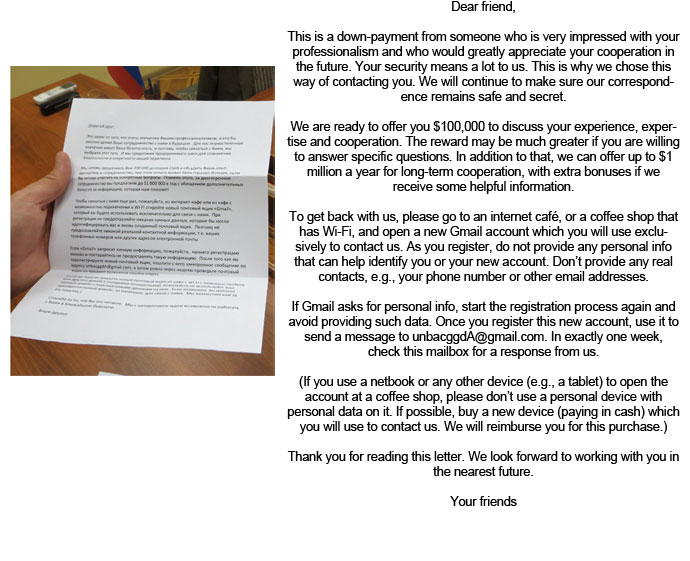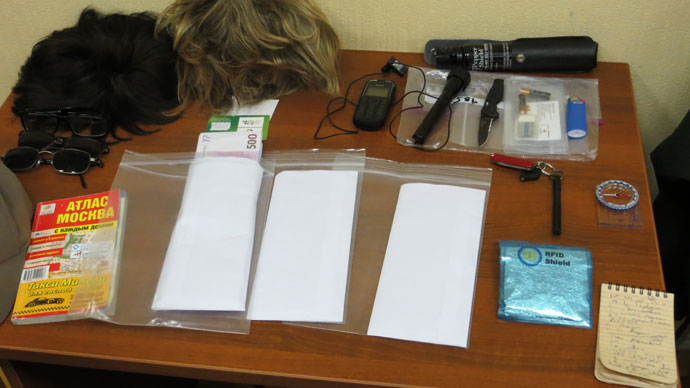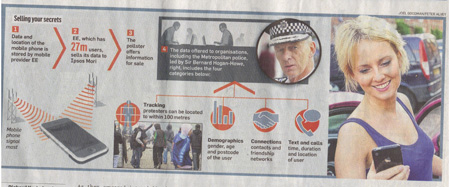The arrest and declaration as persona non grata i.e. the expulsion of the Ryan Fogle a third secretary in the political section of the United States Embassy in Moscow. for allegedly trying to suborn a Russian counter terrorism agent with experience in the North Caucases (i.e. perhaps Dagestan which is of interest to the US authorities after the Boston marathon murders) .
The FSB Russian Federal Security Service, seem to be saying that Fogle phoned his contact at about 11pm on Monday night and asked to meet with him., When the contact declined Fogle insisted and did arrange to meet. Was Fogle under pressure from his superiors ?
This has been heavily spun by the Russian FSB media outlet RT.com and quoted verbatim by western media organisations.
Cloak, dagger and a blond wig? FSB says CIA agent nabbed in Moscow (VIDEO, PHOTOS)
Google Translated "FSB press announcement of the expulsion of Ryan Christopher Fogle.
N.B. a intelligence officer working under diplomatic cover in the US Embassy in Moscow is very likely to work for the CIA, but the people actually interested in making contact with the supposed recruitment target could be from the vast number of other US intelligence agencies.
Unfortunately some of the "evidence", especially the incriminitating letter displayed and translated into English by RT.com is being cited by various journalists and pundits as if it contained "gold standard" espionage tradecraft tips, which could / should also then be used by USA and UK etc. investigative journalists and whistleblowers, who are also now under heavy surveillance by their supposedly benign democratic governments.
e.g. Hear Ye, Future Deep Throats: This Is How to Leak to the Press
RT.com English translation of the alleged incriminating letter.

Dear friend
This is a down-payment from someone who is very impressed with your professionalism and who would greatly appreciate your cooperation in the future. Your security means a lot to us. This is why we chose this way of contacting you. We will continue to make sure our correspondence remains safe and secret.
We are ready to offer you $100,000 to discuss your experience, expertise and cooperation. The reward may be much higher if you are willing to answer specific questions. In addition to that, we can offer up to $1 million a year for long-term cooperation, with extra bonuses if we receive some helpful information.
These are huge sums of money, compared with what people many people, even in the USA have been prepared to betray their country's secrets for.
If this is all a fake FSB set up, perhaps they are trying to drive up the expectations of potential spies to demand more money than even the CIA can afford ?
To get back with us, please go to an internet café, or cofee shop that has Wi-Fi and open a new Gmail account which you will use exclusively to contact us.As you register, do not provide any personal info that can help identify you or your new account. Don't provide any real contacts, e.g. your phone number or other email addresses.
If Gmail asks for personal info, start the registration process again and avois providing such data. Once you register this new account, use it to send a message to unbacggdA@gmail.com. In exactly one week, check this mailbox for a response from us.
unbacggdA@gmail.com does appear to be a still active Google Gmail account, which may or may not have been set up bythe CIA or other US intelligence agencies (or, possibly even by the Russian FSB)
Anyone in Russia would be stupid to try to contact this by email, except perhaps via a foreign , TLS encrypted web mail account.
The instructions regarding Google are uncessarily cumbersome and prone to error
Why all the complex instructions about evadiing the Google two factor authentication process ? This 2 factor authentication may kick in at any time anyway, if the IP address is deemed to be sufficiently different from what Google thinks is your "usual" location.
Wouldn't it have been more professional to have already set up a Gmail account, with further instructions waiting in the mailbox or drafts folder and then to simply share the email address and the log on credentials (Password and the answers to the Security Questions) in this letter ?
That way there could have been ex CIA Director David Petraeus adulterous affair style use of a shared Gmail mailbox (or even Google Drive shared document upload web space) ?
(If you use a netbook or any other device (e.g., a tablet) to open the account at a coffee shop, please don't use a personal device with personal data on it. if possible, buy a new device (paying in cash) which you will use to contact us. We will reimburse you for this purchase.)
Given the extreme difficulty in running a tablet computer securely or anonymously, it is extraordinary that any intelligence agency would suggest using one.
Thank you for reading this letter. We look forward to working with you in the nearest future.
Your friends
Investigative journalists (or British intelligence officers) should not use this alleged incriminating letter as an example of "Moscow Rules" best practice advice for securing confidential source communications.
To have such a letter in your possession is prima facie evidence of espionage or or "conduct incompatible with diplomatic status."
The wording, if genuine, seems to imply that this is the first attempt to recruit or suborn the recruitment target(s), who might be tempted by lots of money, but without any guarantee of real interest on their part.
Surely it is too early in a spy handler / agent relationship to be handing over thousands of Euros in cash (even though you have pronised US dollars) , before any secure communications method has been agreed and tested ?
Items found or allegedly found on Ryan Fogle when arrested are a mixture of the plausible and the suspicious:

- 2 Wigs - the video of his arrest (at night) clearly shows him wearing one of the (obvious) wigs. The quality of the wigs may not be critical at night
Unless the FSB simply plonked a wig on him and staged the arrest footage,then it does look likely that Ryan Fogle was up to something where he did not want to be recognised.
- 3 pairs of spectacles / sunglasses - good Tradecraft - quick and easy to change your appearance slightly.
- Map of Moscow
- A flashlight torch
This looks as if it might have an Infra Red filter attached. This needs a sutable mobile phone or digital camera sensitive in the near Infra Red, or an even more incriminating and suspicious sniperscope or IR goggles, for you to see anything extra with it at nigh.
What use that is on the very first face to face meeting with just a potential, not yet actually recruited agent, is a mystery.
- Orienteering style plastic Magnetic Compass
Some online commentators have wondered why anyone might use a magnetic compass instead of a separate GPS reciever or one built into a Smart Phone. If seized these could easily have accidently recorded and provided evidence of dead drops or meeting places which the investigators were unaware of.
- Another torch or perhaps a laser pointer on a keyring together with a Swiss Army penknife
One online commentator has suggested that this might be a Kubotan
- Lots of cash in 500 Euro notes
Why Euros rather than the promised US dollars, apart from the fact that 500 Euro notes are of higher value than $100 bills and so are more compact. Why not simply offer Euros in the "incriminating letter" ?
N.B. these banknotes look to be new ones, which is suspicious. Don't spies or organised criminals bother to use or demand payments in used, non-consecutively numbered banknotes any more ?
Why don't they use secret bank accounts in offshore tax havens ? Lots of Russians have access to foreign bank accounts e.g. in Cyprus or Dubai or even London etc.
- Pepper Spray (top right on the table) & a lethal looking knife
if you look at the YouTube version of the video released by FSB / RT.com in High Definition quality, you can just about make out the words "Pepper Shield" and the nozzle of what is presumably a Pepper Spray canister.
If you are wandering around Moscow (or any big city) at night, looking like a foreigner in an obvious wig (if seen up close), then perhaps you do need some sort of weapons to ward off muggers etc.
- Peaked baseball style cap - a good bit of Tradecraft , as most CCTV cameras only get glimpses of your face since they usually point downwards from above you. A cap which keeps the sun out of your eyes also helps to hide your full face from such CCTV cameras.
Задержание американского шпиона в Москве (оперативная съемка)
It is strange that the Russian & US & UK media reports do not bother to list either the Pepper Spray or the potentially lethal knife which is clearly visible in the photo / video.
- Unsophisticated looking Nokia (?) mobile phone
There is a wire with a handsfree earpiece / microphone attached to the phone handset..
N.B. the lack of any Radio Frequency Shielded Mobile Phone Evidence Bag, which is standard practice for, say, UK police forces.
They do this to avoid switiching off the power to a mobile phone, before having a chance to forensically examine its memory and to prevent it sending "I have been stolen or seized" alerts via SMS or to stop incomung "Remote Wipe" commands.
If they arrested Fogle on Tuesday night, it does not seem likley that they could have properly examined even a standard Nolkia mobile phone for DNA, fingerprint and other forensic trace evidence techniques, to see who else might have been handling the device e.g. other intelligence officers or other potential or actual spies..
If you suspect that the simple looking Nokia mobile phone might really contain sophisticated CIA / NSA electronics with other hidden functions, then this analysis cannot possibly have been done all on the same night.
It is significant and supsicious that the FSB do not seem to have bothered to do this. Either they are being unprofessional investigators or perhaps this was all a set up.
- Evidence of two mobile phone SIM cards
One plastic card with the charateristic hole in it left by the removal of a mobile phone SIM card (greenish design) can be seen just above the Euro banknotes to the right of the dark wig at the top left of the "evidence" table.
This seems to be a Megafon pre-paid SIM card, with the Sochi Winter Olympics 2014 sponsorship logos.
Another SIM card can be seen unused in its credit card sozed carrier card in a plastic bag with two AAA Duracell batteries and what is probably a mobile phone battery
If the simple mobile phone is a "burner" phone to be disposed of immediately, then why is their evidence of two SIM cards ?
Surely the CIA know that merely swapping a SIM in the same handset (without also illegally re-programming the handset IMEI) does not change the tracability of the mobile phone ?
Both the phone number from the SIM card and the IMEI from the handset are recorded inn every Call Detail Record, whether for voice, SMS text or internet data.
- Bic style disposable butane gas cigarette lighter
- RFID Shield (bottom right)
i.e, metallised plastic film intended to act as a flexible Faraday cage to stop radio waves.
What use is this to an intelligence officer on his way to / from a dead drop or face to face meeting with an human intelligence asset ?
Was it used or intended to be used to shield the Nokia mobile phone or perhaps a different one not seized or not on display ?
Or was it to protect his US Embassy Pass from being tracked (if it contains an RFID chip like a passport etc.)?
- Cheap looking spiral bound paper notepad with indistinguishable writing on it
- Backpack (to the right of the table)
Any Police or Customs seizure of a back pack would have resulted in all the seams and linings being cut open to search for potentially hidden items e,g, drugs
Why didn't the FSB agents, who should be familiar with microfilm etc. do the same ?
The video section showing Ryan Fogle putting his wristwatch back on (no forensic examination for secret spy technology ?) also shows on the table he is sitting at:
- another lighter (black) cigarette lighter
- a packet of Marlboro cigarettes
- another (blue) torch
- a black camera case (presumably with a camera inside) - again there can have been no detailed foresnic examination of these.
RT.com also displayed photos of his Russian issued Diplomatic Photo ID card and his US Embassy Photo ID. Why was he carrying these on a mission ?
Either Ryan Fogle's tradecraft was flawed (he has, after all been arrested and is to be expelled) or his potential recruit did not bite at the offer and called in the FSB.
Some of the "evidence" looks clumsy and unprofessional, which might mean that the FSB has fabricated some or all of this incident.
It seems extraordinary for any intelligence officer to be caught carrying an unencrypted, unhidden (no microfilm or secret ink) letter which provides prima facie evidence of an espionage recruitment attempt.
It is also noteworthy that the counter-terrorism officer who Fogle was supposedly trying to recruit was also reported as the very person physically arresting him and putting on the hand cuffs / exposing the notorious wig. In the old Soviet Union this person would still be under suspicion, regardless of his involvement in the entrapment / arrest of the US diplomat / intelligence officer.




























Recent Comments